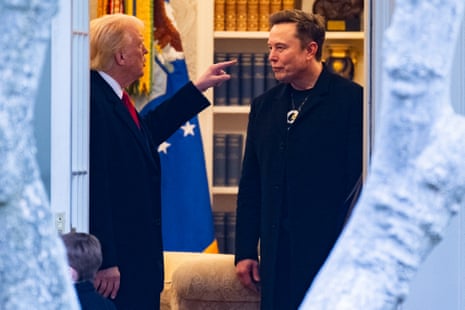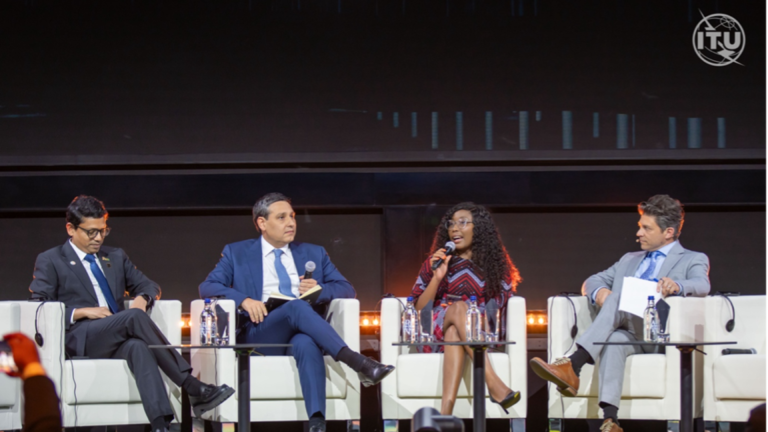Elon Musk Concedes: The Epic Clash of Titans with Trump Unveiled
Elon Musk and Donald Trump’s friendship has soured significantly, with public tensions becoming evident last week as both engaged in a series of sharp exchanges. After a tumultuous four days of their feud, it appears Musk has come out on the losing side, with an unstoppable force meeting an immovable object.
According to reports from Hugo Lowell and Andrew Roth, Musk openly called for Trump’s impeachment and mocked the president’s ties to convicted sex offender Jeffrey Epstein on social media. This was in direct response to Trump threatening to cancel federal contracts and tax subsidies for Musk’s companies, further intensifying their public quarrel over a Republican spending bill that Musk criticized. Musk stated, “Without me, Trump would have lost the election, Dems would control the House and the Republicans would be 51-49 in the Senate,” adding, “Such ingratitude.”
The market reacted swiftly to this ongoing conflict; Tesla shares fell by 15%, wiping out approximately $150 billion from its market value. The repercussions for Trump and the Republican party could be significant, especially with the midterm elections not set until next year.
When Trump and Musk initially allied, many anticipated their relationship would dissolve into a messy fallout, which they have now witnessed. Musk, a powerful ally, brought significant financial support that the Trump campaign and the Republican party needed. However, Trump reflected last week that his closest advisors often exit dramatically due to what he referred to as “Trump derangement syndrome.” Musk’s situation mirrors this pattern. Notably, Steve Bannon, once a key strategist for Trump, was dismissed from the White House and now critiques Trump’s moves through a podcast, calling for Musk’s deportation last week.
While Musk’s initial criticism of Trump appeared severe, by Sunday, he redirected his attention toward other political issues, retweeting supportive messages related to the recent riots in Los Angeles and expressing solidarity with Vice President JD Vance.
The conflict between Musk and Trump underscored the dependence of the U.S. on Musk’s companies for its space operations. Musk even threatened to decommission SpaceX’s Dragon rocket, which is essential for American access to the International Space Station, yet subsequently backtracked under pressure to maintain goodwill. In contrast, Trump has kept his threatening stance, underlining his predilection for retribution, a recurring theme during his political career. Musk, known for targeting less powerful opponents, falters when confronting someone of similar stature, as evidenced by his failed anticipation of a cage fight with Mark Zuckerberg.
The fallout from this fractious relationship raises questions about Musk’s long-term position as it is reported he has lost around $90 billion of his wealth—an astonishing sum, yet he still remains the wealthiest person globally. The crux of the issue may go beyond Musk; it could hint at a broader decline in democratic values, especially as Musk has floated the idea of forming a new centrist political party, dubbed “The America Party.” However, his past political actions suggest he has not aligned with centrist tendencies, showing more divisive traits that may hinder his effectiveness.
AI’s Growing Role in Film Production
Last week, I attended a showcase featuring eight short films produced with the generative AI tool, Runway. Alejandro Matamala-Ortiz, co-founder and chief design officer of Runway, expressed optimism that fully AI-generated two-hour films are imminent. An executive from Lionsgate also mentioned that the studio is increasingly integrating AI into the production process, showcasing its commitment through a partnership with Runway to utilize its archives for training the AI.
However, the films I viewed contradicted the executives’ lofty claims. Six out of the eight shorts failed to evoke any emotion and lacked depth, instead presenting a collection of clichéd narratives and superficial elements. Even though AI can create visuals that mirror any imaginative concept, the films themselves lacked creativity. The generic and polished quality of many AI-generated images made them feel uninspiring, akin to half-hearted attempts at expression. One film, purportedly an anime revenge plot, relied on overused tropes, causing it to become tedious very quickly. Another film, which intended to illustrate the emergence of cicadas, was predominantly composed of uninteresting lens flare shots. Overall, the viewing experience felt reminiscent of mediocre student films.
The majority of these shorts exhibited unclear themes, with cinematography lacking a distinctive viewpoint. Runway reported receiving 6,000 submissions for the competition this year, a massive increase from just 300 the previous year. One can only imagine the challenges confronting the judges amid this deluge.
While some films resembled student projects, this could indicate that the production means are still evolving as filmmakers explore the technology. Runway has introduced new features to its tools since its film festival submissions closed in April, and Google has also launched a video generation tool, Veo 3, which demonstrates greater sophistication than the works presented last week.
Total Pixel Space proved to be a stimulating exploration of the nature of images created by computers, whether depicting real events or entirely fictitious scenarios. The film emphasized how few of the countless possible images we encounter throughout our lives, offering a rare insight amidst an ocean of superficial knowledge. The narration stated, “Total pixel space embodies both the ultimate determinism and the ultimate freedom, where every possibility exists simultaneously, waiting for consciousness to bestow meaning through choice.” This point resonated particularly when examining generated images, which, while residing within a computer monitor’s pixel confines, cannot manifest in the physical realm—highlighting a contrast between limited possibility and fantasy. In considering our finite lives, the film challenges us: what will you choose to experience and attribute significance to?
Ultimately, Total Pixel Space clinched the grand prize at the festival. While the film was successful, it presents a distinct rebuttal to Matamala-Ortiz. If we were to derive a trend for AI-generated films from this festival’s offerings, could we expect lengthy, two-hour video essays? Such films rarely maintain audience interest for that long.
Another contender, Editorial, successfully developed a character and her internal struggles—a foundational element for live-action films yet a daunting challenge for AI-produced content. Despite AI’s current limitations, such as its difficulty in consistently generating the same facial features with varying expressions, I still recommend this short film. It employs a kaleidoscopic effect reminiscent of Everything Everywhere All at Once, showcasing generative AI’s ability to create numerous backgrounds behind characters to craft a visually stunning montage suggestive of interdimensional travel. Achieving such an effect would likely exceed a traditional film’s budget in a mere five seconds, but with AI, it becomes economically viable. Editorial harnesses this potential for a concise, impactful narrative. Perhaps AI’s ultimate role lies in augmentation rather than standalone production. A VP from Lionsgate articulated a similar perspective, noting that AI tools could make a $10 million film appear as though it had a $100 million budget. “We’re going to blow stuff up so it looks bigger and more cinematic,” he conveyed to New York.
This week’s AI news includes:
- London AI firm states Getty copyright case poses an ‘overt threat’ to the industry.
- The ‘death of creativity’? Concerns over AI jobs loom in the advertising sector.
- All civil servants in England and Wales will receive AI training.
- Chinese tech companies halt AI tools in a crackdown on exam cheating.
- Polls indicate that English-speaking nations are more apprehensive about the rise of AI.
What do you want to share with us?
The Guardian’s new feature
The Guardian has introduced a new feature in its app, developed in collaboration with University of Cambridge computer scientists. This feature focuses not on providing information but on receiving it from users. Secure Messaging enables potential news sources to communicate with Guardian staff through the app. To utilize this feature, navigate to the three bars in the bottom right corner of the Guardian app, select “More from the Guardian,” and find “Secure Messaging.” There, you can set up your inbox by creating a passphrase—a sequence of randomly generated words that serves as a key to unlock the vault where your messages will be stored.
Once established, you can send messages to Guardian reporters just as you would a text or email, with significant differences. If you were to text a reporter, your employer or a country’s cybersecurity team might track your internet activity. However, with Secure Messaging, communications to the Guardian blend seamlessly with regular app traffic, appearing as simple news browsing to external observers. For more information about Secure Messaging, click here.
The wider TechScape
- Pornhub’s owner plans to suspend the site in France to protest a new verification law.
- Investigating the hidden world of data brokers: “How did you get my number?”
- 23andMe returns to the auction block after a last-minute bid from its former CEO.
- Donald Trump’s family distances itself from the debut of a crypto wallet: “I know nothing about this project!”







